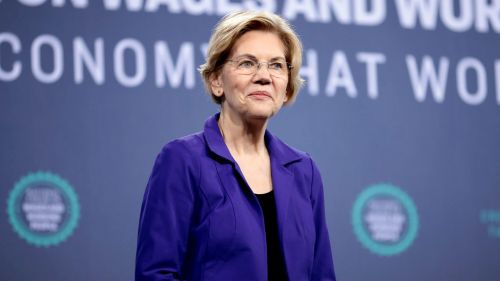Ivory Tower Democrat Voters Will Miss Elizabeth Warren

Council survey data shows that support for Elizabeth Warren for president did not expand to working-class people, which was likely her downfall.
Elizabeth Warren
Elizabeth “I-have-a-plan-for-that” Warren bowed out of the presidential race earlier this month, after a disappointing showing in the primaries through Super Tuesday. While she was at the top of the polls for a brief spell last autumn, by December she had lost ground.
While only a slice of the American electorate found her to be the most appealing candidate, Warren elicited widespread support among foreign policy academics, a particular microsegment comprising Senator Warren’s base. The Teaching, Research, and International Policy (TRIP) project of based out of the College of William and Mary in Virginia conducted a poll of international relations professors and scholars across the United States on their views of the Democratic presidential contest. This survey was conducted from October 30 to December 14 among a total of 4752 foreign policy scholars (response rate = 20%); even though the data are from several months ago and the question included candidates no longer in the race, the results are still relevant in illuminating what motivates a highly educated and specialized sample such as international relations faculty. The large majority of this sample of scholars said they were very likely to vote in the Democratic primary (81%), and their top choice for Democratic candidate was Elizabeth Warren at 49 percent, followed by Pete Buttigieg (16%) and Joe Biden (15%).
Democratic Primary Voters in International Relations Academia
If the Democratic presidential primary or caucus in your state were held today, who would you vote for?
October 30 - December 14, 2019 | n = 692
Source: Trip Surveys
On foreign policy, Warren tried to link her domestic agenda of combating corruption and inequality to her foreign policy platform. She outlined these ideas in her essay in Foreign Affairs, writing, “We can protect American interests first and foremost, while recognizing that those interests are best served when we leverage the support of allies and partners. We can reform international institutions to make them more flexible and inclusive, while still preserving the United States’ global leadership role.” She wrote of the need to “reprioritize diplomacy and reinvest in the State Department and the development agencies,” set the defense budget at “sustainable levels” and to “seriously review the country’s military commitments overseas, and that includes bringing US troops home from Afghanistan and Iraq.”
Scholars’ clear preference for Warren is not based on their perceptions of her foreign policy chops. In a follow up question about who would most effectively manage foreign policy issues facing the United States, scholars most often chose Joe Biden (41%); Elizabeth Warren was the second choice at 20 percent. Their simultaneous preference of Warren as the Democratic nominee and Biden as the most effective foreign policy leader implies a quality in Warren that extends beyond the scholars’ expertise.
Scholars’ ratings of Joe Biden on foreign policy undoubtedly stem from his experience not only from his time as Vice President, but also from his several stints as Chairman of the Senate Foreign Relations Committee; notably, he held the position during the 9/11 attacks. By contrast, Elizabeth Warren’s experience in the Senate is more domestically focused; she established the Consumer Financial Protection Bureau and she chaired the Congressional Oversight. Beyond this however, Senator Warren has been outspoken in her campaign about plans for dealing with a slew of foreign policy problems, as noted above.
Moreover, the data show that being the most effective manager of foreign policy does not seem to be the primary consideration of international relations scholars. A majority of those who said Biden would be the best with foreign policy did not choose Biden as their preferred Democratic candidate; indeed, 27 percent chose Warren, 15 percent chose Pete Buttigieg, and the rest of the responses were split among the remaining candidates.
Ultimately, the fact that such a large proportion—nearly half—of international relations scholars were planning on voting for Elizabeth Warren in the Democratic primaries means that foreign policy experience is not the main quality that determines their voting preference. Elizabeth Warren’s meticulous and thoughtful policy proposals made her stand out as a pragmatic, yet ambitious candidate—something that evidently impressed these scholars. Among the public however, her policy craftsmanship did not seem to resonate. With her candidacy withdrawn, it will be interesting to see whether these foreign policy academics group behind the progressive candidate Senator Sanders or the moderate candidate Joe Biden.
Presidential Preference Among Biden Foreign Policy Supporters
If the Democratic presidential primary or caucus in your state were held today, who would you vote for?
October 30 - December 14, 2019 | n = 692
Source: Trip Surveys
Ultimately, the fact that such a large proportion—nearly half—of international relations scholars were planning on voting for Elizabeth Warren in the Democratic primaries means that foreign policy experience is not the main quality that determines their voting preference. Elizabeth Warren’s meticulous and thoughtful policy proposals made her stand out as a pragmatic, yet ambitious candidate—something that evidently impressed these scholars. Among the public however, her policy craftsmanship did not seem to resonate. With her candidacy withdrawn, it will be interesting to see whether these foreign policy academics group behind the progressive candidate Senator Sanders or the moderate candidate Joe Biden.



